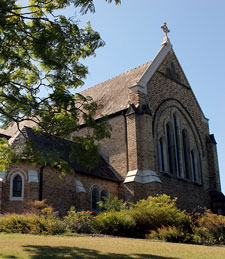 One of the signs of a healthy church is the need to expand facilities for meeting together around God's word. Of course it is not an essential sign of health, as some choose to subdivide when growth outstrips facilities, but it is usually an encouraging sign.
One of the signs of a healthy church is the need to expand facilities for meeting together around God's word. Of course it is not an essential sign of health, as some choose to subdivide when growth outstrips facilities, but it is usually an encouraging sign.
A number of churches in the Northern Region have chosen subdivision, with church plants in schools and community halls. However this year has also seen a resurgence in building projects across the region, including Dee Why, North Epping and West Pymble. Naremburn and Berowra are also in the process of enlarging their church facilities, while Beacon Hill and Asquith are building new rectories.
The early church did not have this problem at the beginning, as they regularly met in the temple courts and in their homes (Acts 2:46). However, the loss of the temple in AD 70 with the convenience of a space for large gatherings required new ways of doing things. Just as Jewish assemblies began during the Babylonian Exile and eventually developed into synagogue buildings, so Christians realised that they needed a larger space for their gatherings.
As the church expanded in the Byzantine era from the fourth century, Christianised towns took often over the local temple and used the space for "church". The temple was usually in a prominent position and provided communal space for Christian assembly. In order to differentiate the worship of God from the worship of idols, the Christians would re-orient the inside of the building. Greek and Roman temples were always oriented towards the west, so Christians took the radical step of re-orienting their buildings towards the east. This was a counter-cultural display of differentiation from pagan worship.
The New Testament knows of no sacred space on earth (John 2:19; 4:21-24). The people of God, gathered around Christ, are the new temple of the Holy Spirit (1 Cor 3:16). Buildings for corporate worship should therefore reflect and enrich the gathering of God's people as they devote themselves "to the apostles' teaching and to the fellowship, to the breaking of bread and to the prayers" (Acts 2:42). While buildings are not essential for our fellowship, they do matter. They can either enhance or degrade our worship of the living God. When the Christians see their gathering as God's temple, they truly reflect the teaching of the apostles.























